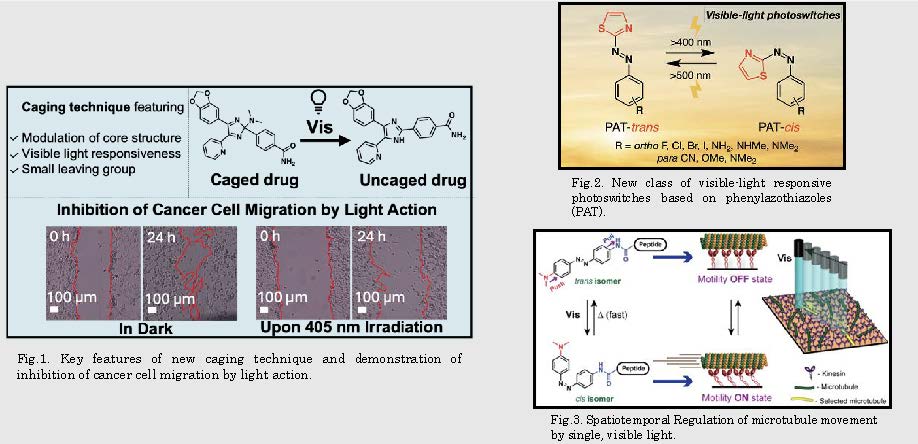RIES
Research Institute for Electronic Science, Hokkaido University
北海道大学
電子科学研究所

LAST UPDATE 2024/08/06
-
研究者氏名
Researcher Nameアマトゥナドゥ・スダカル・アムルタ Ammathnadu Sudhakar Amrutha
助教 Assistant Professor -
所属
Professional Affiliation北海道大学電子科学研究所
物質科学研究部門 スマート分子材料研究分野
Research Institute for Electronic Science, Hokkaido University
Material and Molecular Sciences, Laboratory of Smart Molecules
(Chemical Biology, Photochemistry, Functional Molecules) -
研究キーワード
Research KeywordsPhotoswitches
Motor Proteins
Photopharmacology
Peptides
Caging
- 研究テーマ
Research Subject -
Developing Innovative Approaches to Achieve Spatiotemporal Regulation of Protein Functionality
研究の背景 Background
My research focuses on developing innovative approaches for the spatiotemporal regulation of protein functionality. To achieve this, we begin by designing heteroaryl ring-based, visible light-responsive photoswitches. These photoswitches are then incorporated into biologically active molecules to dynamically control protein functionality. Our latest advancement in this area involves a new caging technique. This technique targets triarylimidazole-based small molecule inhibitors used in anticancer therapy, facilitating photopharmacological applications using visible light.
研究の目標 Outcome
The novel caging method we developed demonstrated the spatiotemporal regulation of cancer cell migration upon visible light irradiation, showcasing the technique's potential for photopharmacological applications.
We developed a new class of photoswitches based on a phenylazothiazole core, which undergoes reversible isomerization using two visible wavelengths and possess longer lifetimes for cis isomers, making them more suitable for biological applications.
By uniquely tethering push-pull type azobenzenes to inhibitory peptides, we demonstrated the spatiotemporal regulation of the movement of a selected, single microtubule driven by kinesin using a single, visible wavelength of light.
研究図Research Figure

Fig.2. New class of visible-light responsive photoswitches based on phenylazothiazoles (PAT).
Fig.3. Spatiotemporal Regulation of microtubule movement by single, visible light.
文献 / Publications
- “Caging Bioactive Triarylimidazoles: An Approach to Create Visible Light-Activatable Drugs” Jiajun Qi, Ammathnadu S. Amrutha, Sumire Ishida-Ishihara, Hisham M. Dokainish, P. K. Hashim, Ryu Miyazaki, Masumi Tsuda, Shinya Tanaka, and Nobuyuki Tamaoki* Am. Chem. Soc. 2024 (Article ASAP, DOI: 10.1021/jacs.4c04468).
- “Phenylazothiazoles as Visible-Light Photoswitches” Runze Lin, P. K. Hashim, Saugata Sahu, Ammathnadu S. Amrutha, Nusaiba Madappuram Cheruthu, Shakkeeb Thazhathethil, Kiyonori Takahashi, Takayoshi Nakamura, Takashi Kikukawa, and Nobuyuki Tamaoki* Am. Chem. Soc., 2023, 145, 16, 9072-9080.
- “Targeted Activation of Molecular Transportation by Visible Light” Ammathnadu S. Amrutha, K. R. Sunil Kumar, Takashi Kikukawa and Nobuyuki Tamaoki* ACS Nano, 2017, 11(12), 12292-12301.
研究者HP
- amrutha
 es.hokudai.ac.jp
es.hokudai.ac.jp - http://tamaoki.es.hokudai.ac.jp/english/